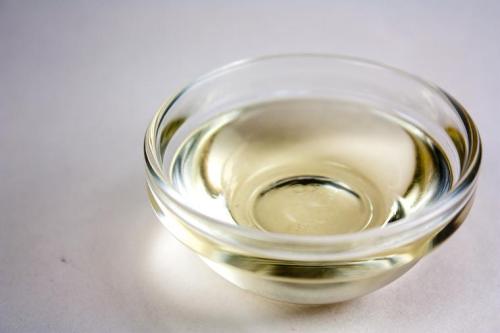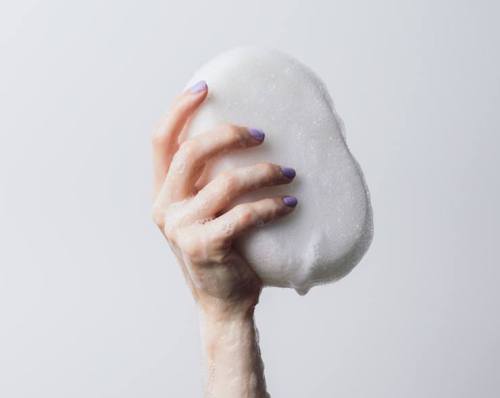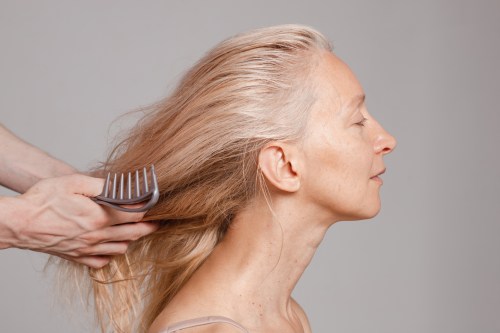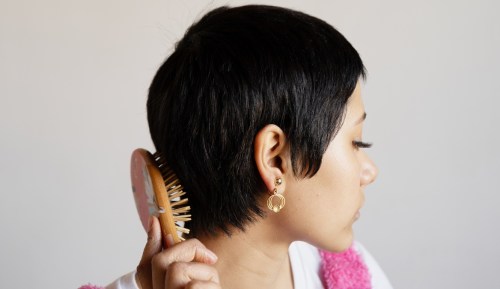Our editors independently select these products. Making a purchase through our links may earn Well+Good a commission
Never mind that it’s found in the kitchen, coconut oil has become the moment’s most obsessed about natural beauty staple.
It has an enthusiastic following of fans who champion the fatty-acid-rich oil as an amazing hair de-frizzer, teeth whitener, body scrubber, and miracle makeup remover. How many of these beauty uses actually pan out?
We cracked open the truth on the nut’s beauty benefits, by tapping cosmetic chemist Ni’Kita Wilson, Look Great, Live Green author and Sumbody founder Deborah Burnes, and Rose-Marie Swift, the formulator-founder of RMS Beauty. —Natz Soberanes
Originally posted July 9, 2013. Updated June 30, 2017.
Here’s what they make of 12 head-to-toe beauty uses for coconut oil.

Frizz fighter
This is one of the most popular beauty uses of coconut oil, because its natural oils repel water and prevent frizz. “Oil and water do not mix,” says Wilson. “So, the coconut oil on the hair prevents moisture from entering the hair shaft to create frizz.” Learn how to use it here. “Coconut oil is absolutely awesome for your hair,” gushes Burnes.

Intensive hair conditioner
All our experts agreed that coconut oil can work wonders for dry, damaged, overly-styled, or can’t-get-the-tangle-out hair. “Its fatty acids soften hair,” says cosmetic chemist Ni’Kita Wilson. How to apply it? Author-beauty formulator Burnes suggests rubbing a small amount of coconut oil between your hands—“so you’re moisturizing them at the same time!”—then applying it to your hair from roots to ends one section at a time. (Note: Thin hair types may not want to apply it to the roots.) Rinse it off in the shower for better-behaving locks, or leave it in if your hair laps it up.

Whitening toothpaste
Should you brush your teeth with coconut oil? Well, a study recently confirmed that a specific form of coconut oil can kill Streptococcus bacteria, which would be a step up from chemicals like triclosan in your toothpaste—and mouth! But it’s not readily available yet.
As for making your pearly whites pearlier, Wilson says there’s no scientific data currently supporting that claim. Still, you might want to try it out in your own bathroom lab, or rinse your mouth with coconut oil (it’s called oil pulling!) for its other wellness benefits.

Makeup remover
“It takes off the most stubborn high-tech mascara with ease,” says makeup artist and formulator Rose-Marie Swift, who’s obsessed with coconut oil’s gentle grime-removing action and antibacterial properties. (Two reasons she uses coconut oil in many RMS Beauty products and makes an RMS Beauty Raw Coconut Cream.)
“And doesn’t it seem like a much healthier option for skin than all those synthetic chemical concoctions?” she asks, providing a third.
Burnes likes it for the eye area, too, adding that it’s uber-hydrating—a boon for what’s often the first place on the face to show lines and wrinkles.

Night cream
Slather this on: In addition to moisturizing your skin, coconut oil can help make your skin work better. “The fatty acids help reinforce the skin’s natural lipid barrier,” says Wilson. “This process helps lock moisture in the skin, promoting hydration.”
However, using coconut oil as a moisturizer might be a little too greasy for some. If you’re one of them, a great alternative is to find a facial moisturizer that uses coconut oil in its base among other natural ingredients, says Burnes.

Lip balm
“If the slip and taste of coconut oil feels good on your lips, then go for it,” says Burnes. According to Wilson, the same fatty acids in coconut oil that help your skin hold onto moisture also provide that love for your lips. “It all comes down to the fatty acids creating a barrier, locking moisture in,” she says.

On cuticles
Our experts think using coconut oil on your cuticles shows serious beauty smarts. One of the properties of coconut oil is that it’s anti-fungal, says Burnes. That’s good for ragged cuticles—and all toes.
And a plus? Coconut oil helps make your nails stronger. “The emollient nature of the coconut oil keeps the cuticles soft,” explains Wilson. “It doesn’t help nails grow, but it can definitely keep your nails from becoming brittle.” To liquify coconut oil, warm it up a little by placing some in a container under running hot water.

Deodorant
Our experts are not so sure about using coconut oil as a natural deodorant on its own. As Wilson explains, there is a study showing coconut oil having antibacterial properties, but coconut oil can’t deodorize or act as an antiperspirant. Though coconut could be helpful in a natural deodorant formulation with herbs, powders, and clays that help it along.

In a soap
Using coconut oil in your soap is a great way to moisturize and soften your hands as you wash up. Our experts love this idea. “It all comes down to the fatty acids in the coconut oil,” says Wilson. “They help soften the skin.”

As a body balm or body scrub
If you’re making body balm with coconut oil, our experts recommend mixing it with a butter (such as shea butter). “You can mix coconut oil with all kinds of butter to make a body balm,” says Burnes.
If you mix coconut oil with sugar or salt, however, you’ve got an amazing body scrub with exfoliating properties. “It’s also great to use on your feet because of the natural anti-fungal properties,” Burnes adds.

Massage oil
Our experts highly recommend using coconut oil as massage oil. Because it doesn’t absorb immediately, “the lubricating effect of coconut oil gives it a long ‘play time,’” which is perfect for a massage, says Wilson.

Shaving cream
This is a beauty trick our experts have yet to try, but that we’ve heard about on the beauty DIY downlow. “I’ve never used it as a shave cream, but due to the lubricating nature of coconut oil, it’s possible,” says Wilson.
Burnes asks, “Does it work as a shaving cream? My gut tells me probably not—it’s going to be too slicky and slidy.” In other words, proceed with caution.

Natural SPF sunscreen
According to our experts, this beauty use is a big no-no.
“I’ve seen an in-vitro (outside of the body) study done with coconut oil showing SPF protection,” explains Wilson. “However, this method is not approved by the FDA, and an in-vivo test must be done on humans to support the data. I would not recommend slathering on coconut oil for UV protection.”
Burnes agrees. “Using coconut oil as a natural sunscreen is really irresponsible. Yes, it may have an SPF of 3, but the oil is going to bake your skin more than the SPF is going to protect you.” (Instead go for one of these nontoxic picks.)

To prevent stretch marks during pregnancy
“I wish that it really did!” says Wilson. Even though it can’t hurt to coat your belly with it, coconut oil won’t prevent your skin from showing signs of stretching when you’re pregnant.
“Coconut oil keeps the skin soft, but it doesn’t have an effect on the actual elasticity of the skin,” Wilson explains.
Coconut oil isn’t the only pantry item that works beauty wonders. These nine foods are amazing for your skin and everything on this list will give you super shiny hair.

Sign Up for Our Daily Newsletter
Get all the latest in wellness, trends, food, fitness, beauty, and more delivered right to your inbox.
Got it, you've been added to our email list.










